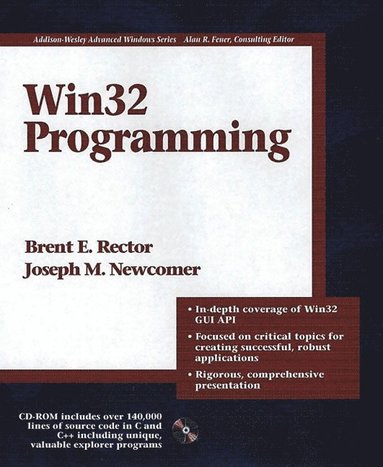
- Format
- Inbunden (Hardback)
- Språk
- Engelska
- Antal sidor
- 1568
- Utgivningsdatum
- 1997-01-01
- Upplaga
- 1
- Förlag
- Addison Wesley
- Medarbetare
- Newcomer, Joseph M.
- Illustratör/Fotograf
- illustrations
- Illustrationer
- Ill.
- Dimensioner
- 241 x 195 x 60 mm
- Vikt
- Antal komponenter
- 1
- ISBN
- 9780201634921
- 2480 g
Win32 Programming
For Windows 95 and Windows NT
Slutsåld
Kundrecensioner
Övrig information
Brent E. Rector is President of Wise Owl Consulting, Inc., a firm that specializes in Windows/COM development and consulting. He also teaches classes on COM, ATL, and MTS for DevelopMentor, a leading COM education firm. He received the Microsoft Annual MVP (Most Valuable Professional) award for his contributions to CompuServe's Windows forums. Joseph M. Newcomer is head of The Joseph M. Newcomer Company, where he specializes in Windows application design, device drivers, and real-time and embedded systems. He has considerable experience in compiler and operating system design and implementation. A frequent contributor to Dr. Dobb's Journal, he has also written several books, including Win32 Programming (with Brent Rector, Addison-Wesley). In addition to his consulting practice, he serves as adjunct senior scientist at Carnegie Mellon University and has been an active contributor to CompuServe and Internet Windows online forums. Dr. Newcomer is one of the principal authors of IDL: The Language and Its Implementation, and is co-inventor on several patents on distributed information technology. In recognition of these contributions, he was named a Most Valuable Professional (MVP) by Microsoft.0201634929AB04062001
Innehållsförteckning
(Most chapters conclude with "Further Reading".)
Welcome xliii.
Tools Required xliii.
Typeface conventions xlv.
Icons for insertions xlv.
1.
2.
A Skeletal Windows Application.The Skeleton Application Source Program.The WinMain Function.The Parameters to WinMain.WinMain Initialization.Initialization: initInstance.WinMain's Message Loop.The Window Function.General Structure.Message Handling: WM_DESTROY.Message Handling: WM_COMMAND.The About Dialog Function.The Components of the Skeleton Application.Resource Definition Files.The Skeleton.h Header File.Building and Running the Skeleton Program.Message Crackers.Further Reading.
3.
Exploring Variations on a Window.Default Behavior for a Window.My, How Stylish You Look.Class Styles.Window Styles.Overlapped Windows.Pop-up Windows.Child Windows.Other Window Styles.Extended Window Styles.The Panes Example Program.The Panes Source Code.Class Registration in Panes.Window Creation in Panes.Message Hand...
Du kanske gillar
-
Lean Startup
Eric Ries
Häftad -
HTML and CSS
Jon Duckett
Häftad -
Nexus
Yuval Noah Harari
Häftad -
Code
Charles Petzold
Häftad -
Careless People
Sarah Wynn-Williams
Inbunden
